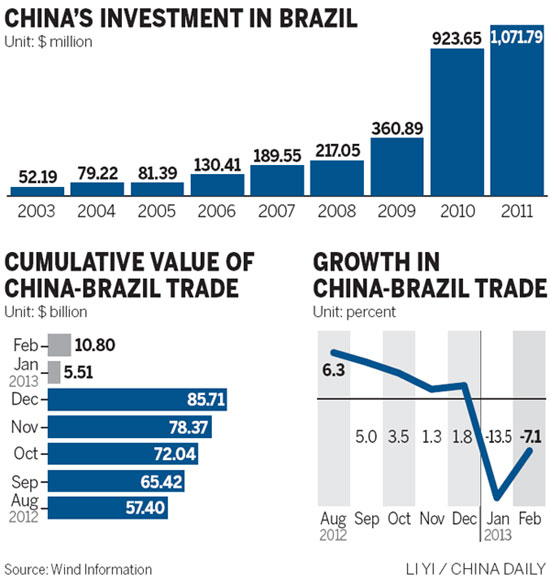Sino-Brazilian trade to see steady growth
Updated: 2013-03-21 07:33
By Bao Chang (China Daily)
|
||||||||
Trade between China and Brazil is on the rise, but it will increase at a steady pace in the coming years as it becomes more mature, Roberto Azevedo, Brazil's permanent representative to the World Trade Organization, said on Wednesday.
Azevedo - who is also Brazil's candidate for the WTO's director-general job - met Minister of Commerce Gao Hucheng during a two-day trip to Beijing.
"There are several factors affecting the trade trends between the two countries. One important trend is that bilateral trade is currently commodity-oriented and commodity prices have a big influence on trade volume," said Azevedo.
Goods including iron ore, petroleum, steel and soybeans account for nearly 80 percent of Brazil's exports to China. Major Chinese exports to the Latin American country are vehicles, clothing and manufactured components.
China is Brazil's biggest trade partner, while Brazil is China's fifth-largest trading partner.
In 2012, Sino-Brazilian trade volume rose 1.8 percent year-on-year to $85.72 billion. The growth rate was 33.2 percentage points lower than in 2011, according to data from the Ministry of Commerce.
"For a while, commodity prices were growing very fast, but now prices are stable or are decreasing, so the price adjustments have an impact on trade figures," Azevedo said.
As the peak oil consumption season is coming to an end, international oil prices have fallen. Meanwhile, global demand for soybeans is estimated to remain at a stable level this year.
"In addition, the growth rates of many economies are lower than they were before and trade usually follows that because a big part of trade depends on the input of the production chain, which is slowing down," Azevedo added.
A trade growth rate of about 30 percent per year is not sustainable, Azevedo said, adding that bilateral trade is expected to grow at a stable rate.
China is the biggest investor in Brazil, with projects in sectors such as commodities, agriculture and automobiles.
"Agriculture is always productive in Brazil, and China has strong demand for food due to its big population. So the two nations are naturally complementary in this field," Azevedo said.
He added that China is very welcome to invest in the sector.
Regarding the increasing number of global trade disputes, Azevedo noted that both China and Brazil have actively participated in the WTO's dispute settlement mechanism.
"The more trade interaction there is between China and Brazil, the more potential to solve disagreements between the two countries there will be," Azevedo said.
He said that in recent years, the BRICS countries have been increasing their participation in the decision centers of multilateral systems, not only in trade but also in other international organizations. To extend their presence, they should keep exchanging views and boosting coordination in areas where they have common interests.
baochang@chinadaily.com.cn

(China Daily 03/21/2013 page13)

 Li Na on Time cover, makes influential 100 list
Li Na on Time cover, makes influential 100 list
 FBI releases photos of 2 Boston bombings suspects
FBI releases photos of 2 Boston bombings suspects
 World's wackiest hairstyles
World's wackiest hairstyles
 Sandstorms strike Northwest China
Sandstorms strike Northwest China
 Never-seen photos of Madonna on display
Never-seen photos of Madonna on display
 H7N9 outbreak linked to waterfowl migration
H7N9 outbreak linked to waterfowl migration
 Dozens feared dead in Texas plant blast
Dozens feared dead in Texas plant blast
 Venezuelan court rules out manual votes counting
Venezuelan court rules out manual votes counting
Most Viewed
Editor's Picks

|

|

|

|

|

|
Today's Top News
Boston bombing suspect reported cornered on boat
7.0-magnitude quake hits Sichuan
Cross-talk artist helps to spread the word
'Green' awareness levels drop in Beijing
Palace Museum spruces up
First couple on Time's list of most influential
H7N9 flu transmission studied
Trading channels 'need to broaden'
US Weekly

|

|







